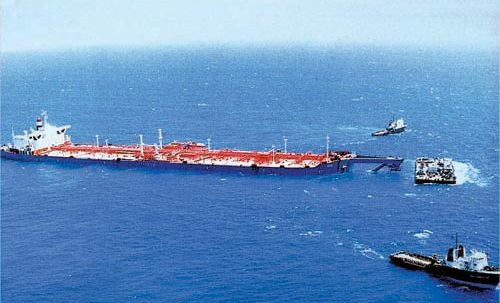Officials from the United Nations and Yemen’s Houthi represents independently confirmed that progress continues to be made to address the FSO Safer anchored off Yemen holding 1.1 million barrels of crude oil. Last month, during a briefing to the UN Security Council, UN envoys to Yemen reported that they believed they had a tentative path forward to address the environmental risk from the aging vessel that had been accepted by the rebels that control the region of the country.
“A memorandum of understanding has been signed with the United Nations for the Safer tanker,” Mohammed Ali al-Houthi, head of the Houthi supreme revolutionary committee, wrote on Twitter. It marked the first acknowledgment of the agreement after years of on and off discussions and earlier agreements. The rebels previously demanded that UN inspectors also undertake the maintenance of the aging vessel that currently is only maintained by a skeleton crew with limited resources. Several years ago, the owners of the vessel said they no longer had the resources to properly maintain the vessel leading to fears of a massive oil leak if the vessel failed.
UN spokesman Stéphane Dujarric during his daily briefing on March 7 provided a few additional details on the agreement while emphasizing it was contingent on financial donors participating in the project. He, however, confirmed that the UN Resident and Humanitarian Coordinator for Yemen, David Gressly, signed a Memorandum of Understanding with the Houthi to establish a framework for cooperation on the UN-coordinated proposal to resolve the threat posed by the FSO Safer.
After the last round of negotiations fell apart in 2021, the UN special envoy said they would have to develop a new approach to resolve the threat. The plan that has been accepted calls for a short-term solution to “eliminate the immediate threat by moving the million barrels of oil aboard the Safer to an oil tanker. The spokesperson declined to comment on the long-term solution including if the plan is to sell the oil saying that Gressly and the UN are focused on finalizing the operation plan for moving forward.
The UN cited challenges including finding the staff, technology, and a suitable vessel to be able to transfer the oil. They declined to put a price tag on the project saying it depends on market rates. The spokesperson only said, “it’s not hundreds of millions of dollars … it’s a lot of money.”
Discussions are already underway with neighboring countries regarding the plan and the spokesperson cited the involvement of the Netherlands’ Ambassador to Yemen. The ambassador joined a UN mission that included a visit to Ras Issa terminal near the anchor point for the Safer. He participated in discussions with local authorities.
“The Netherlands, they have taken a very important role and leadership on the part of the donors, which we very much appreciate,” said the UN spokesman responding to questions from the media. He also highlighted the Netherlands’ capacity and technology as well as expertise in maritime salvage.
Previous agreements fell apart with each side blaming the other and the UN saying the safety of its teams could not be guaranteed. Both sides remain optimistic that the new approach will provide the solution to the long-standing danger from the tanker.
Source: The Maritime Executive






